Relocating to another country often brings excitement and challenges. One of the biggest concerns for many people is finding a suitable place to live. Renting a house or apartment abroad can be confusing, especially if you are not familiar with local laws, customs, or languages. Understanding the process, doing proper research, and taking smart precautions can help you avoid common problems and enjoy a smooth renting experience.
This guide offers useful tips to help foreigners rent a house or apartment abroad confidently and safely.
1. Research the Local Rental Market
Learning about the rental market in your destination country is the first step. Prices, rental terms, and property types can vary widely.
Key Points to Research:
- Average rent prices in various neighborhoods
- Popular housing websites or apps
- Typical lease durations
- Whether furnished or unfurnished apartments are common
Rental Market Overview Examples
| Country | Average Monthly Rent (1-bedroom city center) | Lease Duration | Common Inclusions |
|---|---|---|---|
| Germany | $950 | 12 months | Unfurnished, heating extra |
| Thailand | $400 | 6–12 months | Furnished, utilities extra |
| Canada | $1,300 | 12 months | Unfurnished, heating included |
| Portugal | $800 | 12 months | Furnished or unfurnished |
| UAE | $1,200 | 1–12 months | Furnished, utilities vary |
2. Decide Your Budget and Location
Setting a clear budget helps narrow down your search. Always consider not just the rent but also additional costs such as utilities, internet, and maintenance fees.
Important Costs to Consider:
- Rent
- Utilities (water, electricity, gas)
- Internet and cable TV
- Property maintenance or service fees
- Transportation or commute costs
Sample Monthly Budget Breakdown
| Expense Type | Estimated Cost (in USD) |
|---|---|
| Rent | $1,000 |
| Electricity & Water | $80 |
| Internet | $40 |
| Public Transport | $60 |
| Groceries | $300 |
| Total Estimated Cost | $1,480 |
3. Use Reliable Rental Platforms
Avoid scams by sticking to trusted platforms. Local real estate websites, social media housing groups, and licensed agents can offer listings that match your needs.
Tips for Choosing a Platform:
- Check platform reviews
- Look for verified listings
- Avoid listings with no photos or incomplete details
- Be cautious of offers that sound too good to be true
Popular Platforms by Region:
| Country/Region | Popular Rental Platforms |
|---|---|
| Europe | Idealista, Immowelt, Rightmove |
| Asia | 99.co, PropertyGuru, Dot Property |
| USA/Canada | Zillow, Craigslist, Rent.ca |
| Middle East | Bayut, Dubizzle |
| Latin America | Inmuebles24, OLX |
4. Understand Rental Agreements Thoroughly
Reading and understanding the lease agreement is vital before signing anything. Legal terms and conditions may differ from your home country.
What to Look For in the Lease:
- Monthly rent and payment schedule
- Lease duration and termination rules
- Deposit amount and refund terms
- Maintenance responsibilities
- Guest policy and house rules
Checklist: Lease Agreement Review
| Item | Check |
|---|---|
| Lease term clearly mentioned | ✔ |
| Monthly rent & due date noted | ✔ |
| Deposit and return conditions | ✔ |
| Repair & maintenance rules | ✔ |
| Termination or renewal process | ✔ |
5. Always Visit the Property or Get a Virtual Tour
Seeing the property before committing can help you avoid scams or disappointment. If you can’t visit in person, request a virtual video tour.
Why Property Viewing is Important:
- Confirms the property is real
- Shows the actual condition
- Helps you understand the neighborhood
- Lets you meet the landlord or agent
Questions to Ask During a Tour:
- Is anything broken or damaged?
- What appliances are included?
- What’s the neighborhood like?
- Is there 24/7 water and electricity?
6. Confirm Landlord Identity and Ownership
Before paying anything, make sure the landlord is the actual property owner or an authorized agent. Scammers often post fake listings.
How to Verify Landlord/Agent:
- Ask for an ID and ownership proof
- Check registration documents
- Contact previous tenants (if possible)
- Use licensed real estate agents only
Documents You May Need:
| Document | Purpose |
|---|---|
| Passport/ID | For identity verification |
| Visa or Residence Permit | Legal stay proof |
| Employment Letter/Bank Statement | For financial stability confirmation |
| Lease Agreement | Legal renting contract |
7. Understand Local Laws and Tenant Rights
Every country has different rules regarding renting. Understanding your legal rights can protect you from illegal evictions, deposit scams, and unfair charges.
Important Laws to Learn About:
- Eviction notice period
- Rent control rules
- Deposit return policies
- Noise and visitor laws
- Right to repairs
Tenant Rights Snapshot
| Country | Deposit Limit | Eviction Notice | Rent Increase Rules |
|---|---|---|---|
| France | 1 month’s rent | 3 months | Annual limit set by law |
| Japan | 2 months’ rent | 1 month | Landlord must provide reason |
| USA (varies) | 1–2 months | 1–3 months | Varies by state |
| Australia | 4–6 weeks | 30–90 days | Max annual increases allowed |
8. Know How to Handle Deposits and Payments
Deposits are usually required upfront. Make sure you receive a receipt and clearly understand the refund terms.
Tips for Handling Payments:
- Use official channels (bank transfer preferred)
- Avoid paying in cash unless necessary
- Always get a written receipt
- Take photos of property condition during move-in
Red Flags in Payment Process:
- Landlord refuses a written contract
- Urges quick payment without showing the property
- Payment requested through unverified platforms
9. Consider a Short-Term Rental First
If you’re unsure about an area or want flexibility, consider short-term rentals first. This gives you time to adjust and find the perfect long-term place.
Short-Term Options Include:
- Airbnb or serviced apartments
- Co-living spaces
- Hostels with monthly plans
- Student housing (if eligible)
10. Connect with Locals or Other Expats
Talking to locals or expats can give you valuable insights. They might recommend good neighborhoods, trusted agents, or even help with translations.
Ways to Connect:
- Facebook expat groups
- Forums like Reddit or Internations
- Language exchange meetups
- University or community boards
Final Thoughts
Renting a house or apartment in a foreign country may feel overwhelming at first, but careful planning and smart decisions can make the process much smoother. From researching the market and verifying property details to understanding legal agreements and connecting with locals, each step plays a crucial role in ensuring a stress-free housing experience abroad. By following these practical tips, you can secure a comfortable home that suits your needs and enjoy your new life overseas with confidence.

